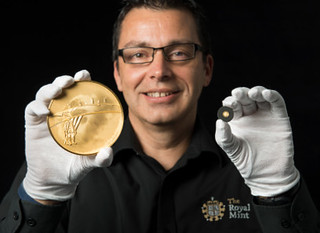
PREV ARTICLE
NEXT ARTICLE
FULL ISSUE
PREV FULL ISSUE
THE ROYAL MINT'S SMALLEST AND LARGEST COINS GO ON TRIALThe Trial of the Pyx is one of the oldest traditions in minting. The February 5, 2015 issue of CoinsWeekly has a nice article
about the latest incarnation of the Royal Mint's annual coin testing procedure. -Editor
Weighing just one fortieth-ounce and measuring a delicate 8mm wide, the coin features a modern interpretation of Britannia. The imposing Kilo coin measures at 100mm wide and continues The Royal Mint’s five-year commemoration of the centenary of the First World War. The Trial of the Pyx is an ancient annual ceremony and is one of the oldest quality assurance trials in the world. At the Trial, samples of circulating and commemorative coins produced by The Royal Mint over the last year are selected at random and weighed for accuracy. Now held at Goldsmiths’ Hall, London, the Trial was first recorded publicly in 1282, and is today presided over by the Queen’s Remembrancer or their deputy, who are amongst the highest legal representatives in the country, assisted by an independent jury of Liverymen of the Goldsmiths’ Company. During the ceremony jury members are presented with Pyx boxes (Pyx being the Roman word for chest). The coins are selected from a random selection provided by The Royal Mint and placed in copper bowls. The remainder are placed in wooden bowls and are then weighed for accuracy. The Trial is then adjourned until May to allow time for trial coins to be tested by Goldsmiths Assay Laboratory and the National Measurement Office. Whilst modern methods such as XRF (X-Ray Fluorescence) are often used in assaying, it is still only the centuries old methods such as cupellation (the fire assaying of gold) that are accurate enough in the testing of metals and therefore remain credible for checking the accuracy of the coins of the realm for the Trial of the Pyx verdict. Modern legislation does not mention penalties for an adverse verdict by the Pyx jury, yet there have been stiff punishments for failure in the past. The Master of the Mint (today a role held by the Chancellor of the Exchequer) went to prison for six weeks in 1318 and even Sir Isaac Newton was at loggerheads with the jury during his time as master of the Mint when the integrity of his coin samples was questioned. To read the complete article, see:
THE BOOK BAZARREWayne Homren, Editor The Numismatic Bibliomania Society is a non-profit organization promoting numismatic literature. See our web site at coinbooks.org. To submit items for publication in The E-Sylum, write to the Editor at this address: whomren@gmail.com To subscribe go to: https://my.binhost.com/lists/listinfo/esylum All Rights Reserved. NBS Home Page Contact the NBS webmaster 
|
